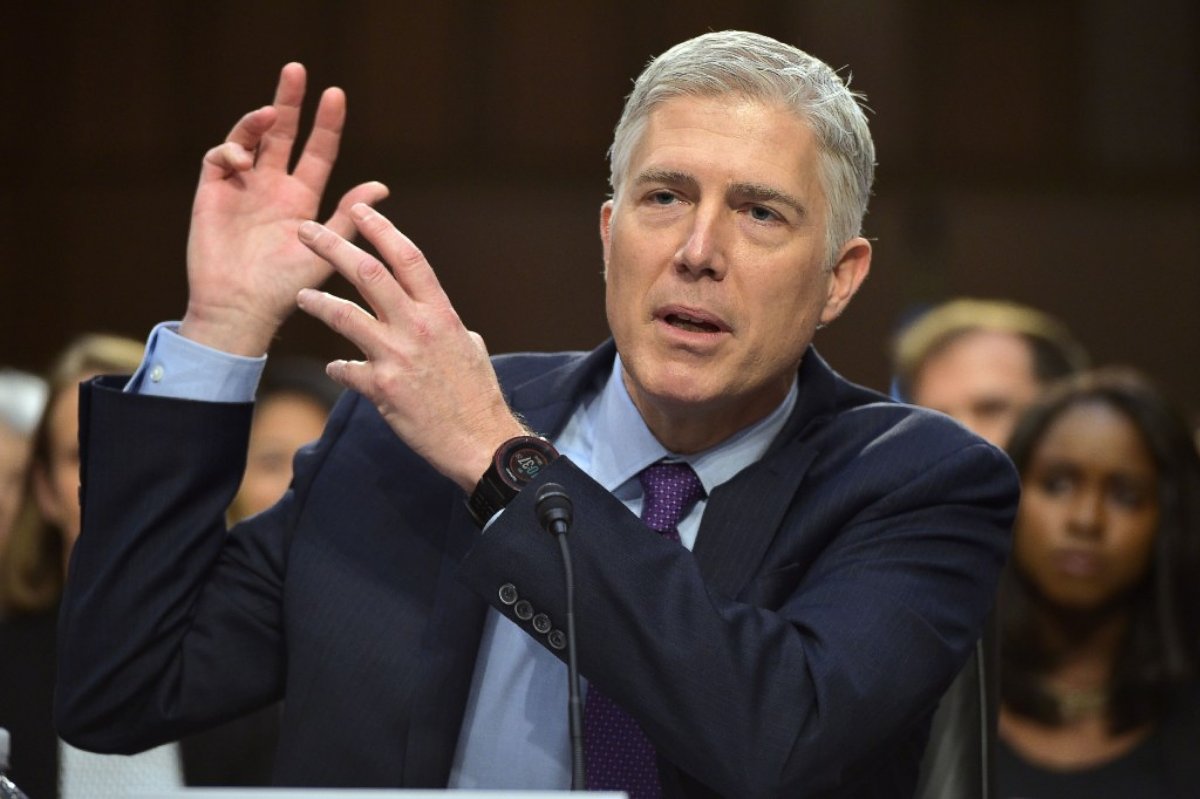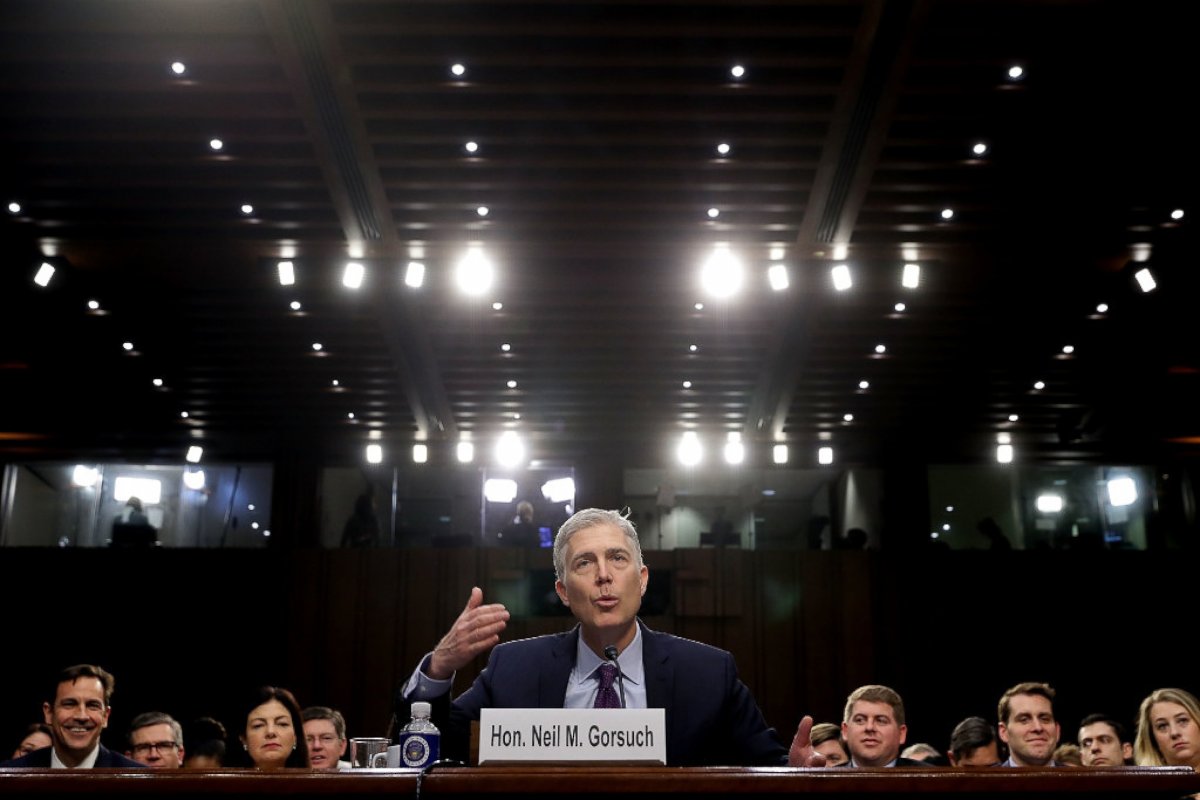Supreme Court nominee seeks distance from Trump administration, says attacks on federal judges 'disheartening'
Republicans and Democrats grill the SCOTUS nominee Tuesday.
— -- Judge Neil Gorsuch sought to distance himself from the Trump administration and slam the president for his attacks against federal judges during his testimony before members of Congress on Tuesday, his second day of a Supreme Court confirmation hearing.
Gorsuch said he was offended by language used by President Trump, who has a history of lashing out against federal judges involved in cases that are not in his favor.
In February, Trump appeared to question the legitimacy of a federal judge who temporarily blocked his controversial travel ban and called him a "so-called judge."
Last year, Trump suggested that a federal judge overseeing a lawsuit against Trump University was biased because of his Mexican heritage.
"When anyone criticizes the honesty or integrity, the motives of a federal judge, I find that disheartening. I find that demoralizing, because I know the truth," Gorsuch said.
When Gorsuch was asked if "anyone" included Trump himself, Gorsuch responded, "Anyone is anyone."
Moments after Gorsuch made these remarks, Trump brought up the recent court decision blocking his revised travel ban at the National Republican Congressional Committee Dinner.
"The courts are not helping us, that I have to tell you," Trump said. "It’s ridiculous. Somebody said I should not criticize judges, okay, I’ll criticize judges."
During the hearing, Gorsuch also refused to say whether he'd support or undermine a travel ban barring citizens from six Muslim-majority countries from entering the United States.
"I'm not going to say anything here that would give anybody any idea how I would rule in any case that could come before the Supreme Court or my court of the 10th Circuit," Gorsuch said in reference to the travel ban. "It would be grossly improper of a judge to do that."
But Gorsuch stressed to Republican and Democratic members of the Senate Judiciary Committee that Trump's authority on national security matters is limited.
"Nobody is above the law in this country and that includes the president of the United States," Gorsuch said, rejecting the idea that he is a surrogate for Trump or a particular interest group.
Gorsuch was quizzed for hours by the 20-member committee about his career as a federal judge, his understanding of precedent in the law as it applies to landmark Supreme Court cases and whether or not he could be impartial to the executive branch.
At one point, Gorsuch was forced to deny that he made any promises to Trump before accepting the nomination to be the next Supreme Court justice in an effort to assure senators that he is not beholden to the president.
“I have offered no promises on how I’d rule on any case to anyone and I don’t think it’d be appropriate for a judge to do so," Gorsuch said.
"You should be reassured, no one in the process from the time I was contacted to the time I was nominated, no one asked me for any commitments in any kind of case," Gorsuch added in response to further questions from committee chairman Chuck Grassley of Iowa.
Gorsuch said he interpreted judicial independence as a no-brainer.
"There’s no such thing as a Republican judge or a Democratic judge. We just have judges in this country," he said.
Sen. Sheldon Whitehouse, a Democrat from Rhode Island, repeatedly asked Gorsuch if he knew who was behind a reported $10 million dark money political ad campaign working in his favor. Dark money refers to funds given to organizations that do not have to be disclosed publicly.
"I know there's a lot of money being spent as I understand it by both sides," Gorsuch quipped.
Whitehouse pressed again, "Do you know who is spending the money?"
“You’d have to ask them,” Gorsuch said.
Whitehouse fired back: “I can’t because I don’t know who they are. It is just a front group.”
Republicans later came to his defense and gave Gorsuch another opportunity to dismiss the idea that organizations with dark money have his support.
“Nobody speaks for me,” Gorsuch said. “Nobody. I speak for me. I am a judge. I don’t have spokesmen. I speak for myself.”
In an exchange with Sen. Richard Durbin, D-Ill., Gorsuch addressed the controversy surrounding alleged comments he made last year about women abusing maternity leave for benefits.
Gorsuch clarified that he believed asking a prospective hire if she was planning to have a baby would be an "inappropriate question" and that comments he made during a classroom discussion were taken out of context.
"We talk about the pros and the cons in this dialogue that they can think through for themselves how they might answer that very difficult question," Gorsuch said about his conversations with students in his class at the University of Colorado.
He continued, "I ask it of everybody. How many of you have had questions like this asked of you in the employment environment? An inappropriate question about your family planning. I am shocked every year, senator, how many young women raise their hand. It's disturbing to me."
Durbin also asked Gorsuch about a case involving a truck driver who believed he was wrongly fired. The driver had radioed for help after the brakes on his trailer froze and was told to wait for a repair truck to arrive. Hours later, the truck driver, numb and disorientated from sitting in the unheated truck for hours in freezing temperatures, decided to unhook the trailer from the truck so he could seek assistance.
The truck driver was eventually fired for breaking protocol but a judge later concluded that his firing violated whistleblower provisions. As an appeals court judge, Gorsuch was the sole dissenter in the case and sided with the trucker's employer.
"Senator, all I can tell you is my job is to apply the job you write. The law as written said he would be protected if he refused to operate, and I think by any plain understanding, he operated the vehicle. If congress wishes to revise the law, I wrote this -- I wrote -- I said it was an unkind decision. I said it may have been a wrong decision, a bad decision, but my job is not to write the law," Gorsuch said.
Sen. Dianne Feinstein, the committee's ranking member, expressed her concern for women's rights by recalling Trump's campaign promise to overturn Roe v. Wade and the right to an abortion.
"It is a precedent in the United States Supreme Court," Gorsuch replied. "It has been reaffirmed many times."
Feinstein asked about wiretapping -- Gorsuch said he believed the president does not have the authority to intercept communications -- and she inquired about previous cases he had ruled on, including on workers' rights.
"How do we have confidence in you that you won't just be for the big corporations, that you will be for the little man?" Feinstein asked.
"The bottom line is that I'd like to convey to you from the bottom of my heart is that I'm a fair judge," Gorsuch responded. "I can't guarantee you more than that, but I can promise you absolutely nothing less."
Democrats have promised to push back on Trump's nominee in light of the Republicans' refusal to grant President Obama's nominee, Judge Merrick Garland, his own confirmation hearings last year.
"Do you think he was treated fairly by this committee? Yes or no," asked Sen. Patrick Leahy, D-Vt.
"As I explained to you before, I can't get involved in politics," Gorsuch replied.

On Monday, after listening to more than three hours of prepared opening statements and remarks by the committee, Gorsuch testified on a message of unity and respect for the rule of law while paying homage to his mentors including the late Justice Antonin Scalia, whom he could replace on the bench.
Gorsuch, 49, is a judge on the 10th Circuit Court of Appeals in Denver. He was nominated by President George W. Bush in 2006 and confirmed by the Senate in a voice vote. He clerked for Judge David B. Sentelle on the United States Court of Appeals for the D.C. Circuit and then for Justices Byron White and Anthony Kennedy on the Supreme Court. He attended Harvard Law and has a Ph.D. from Oxford, where he was a Marshall scholar.
Calling the judgeship a "lonely and hard job," Gorsuch hailed his own ability to remain neutral and independent in the face of an executive branch that could press its own agenda.
"Putting on a robe reminds us that it's time to lose our egos and open our minds," Gorsuch said.
Republicans heaped praise on Gorsuch for his "exceptional" record.
"Fortunately for every American, we have before us today a nominee whose body of professional work is defined by an unfailing commitment to these principles. His grasp on the separation of powers — including judicial independence — enlivens his body of work," Grassley said.
Sen. Lindsey Graham, (R-SC), said in his remarks, "Donald Trump deserves to be congratulated for listening to a lot of people and coming up with what I think is the best choice available in terms of nominating someone who will keep the conservative philosophy alive and well in the court."
"We're here today under very unusual circumstances," Feinstein said, in reference to Garland.
"I just want to say I'm deeply disappointed that it's under these circumstances that we begin our hearing," she added.

Feinstein and other Democrats addressed issues of relevance to most Democrats in their prepared remarks -- reproductive rights, voting rights, campaign finance, the environment and gun control, while stressing the role of the Supreme Court in upholding landmark decisions and protecting the constitutional rights of all Americans, including women, people of color, other minorities and the poor.
Sen. Mazie Hirono, (D-Hawaii), told Gorsuch that she had "not seen that the rights of minorities are a priority for you. In fact, a pattern jumps out at me. You rarely seem to find in favor of the little guy."
She continued, "The Supreme Court shapes our society ... Will America be a land of exclusivity for the few or the land of opportunity for the many? Will we be a compassionate and tolerant America that embraced my mother, my brothers and me? ... You consistently choose corporations and powerful interests over people."
When it comes to religious liberties and access to contraception, Gorsuch is a defender of the First Amendment's free exercise clause, which reads, "Congress shall make no law respecting an establishment of religion or prohibiting the free exercise thereof."
He sided with Christian employers and religious organizations in the Burwell v. Hobby Lobby and Little Sisters of the Poor cases, in which the plaintiffs argued for an exemption from the contraception mandate in Obama's signature health care legislation, the Affordable Care Act, citing their religious beliefs.
In the Hobby Lobby case, Gorsuch wrote, "The ACA's mandate requires them to violate their religious faith by forcing them to lend an impermissible degree of assistance to conduct their religion teaches to be gravely wrong."
When it comes to criminal procedure, he dissented in the United States v. Carlos case, arguing that police officers violated the Fourth Amendment when they entered a home that had a "no trespassing" sign posted.
In a press conference last week, Senate Minority Leader Chuck Schumer of New York cautioned that Gorsuch has important questions to answer about some of his opinions, most notably "his decisions he wrote that favored the powerful over the powerless."
Schumer last week suggested that he would not support the confirmation of Gorsuch and urged his Senate Democratic colleagues to do the same.
Leonard Leo of the Federalist Society told ABC News he is confident that "Gorsuch will be confirmed."
The hearings are expected to conclude by the end of the week. Grassley announced he will call for a vote on Gorsuch's nomination on April 3.
ABC News' Audrey Taylor contributed to this report.